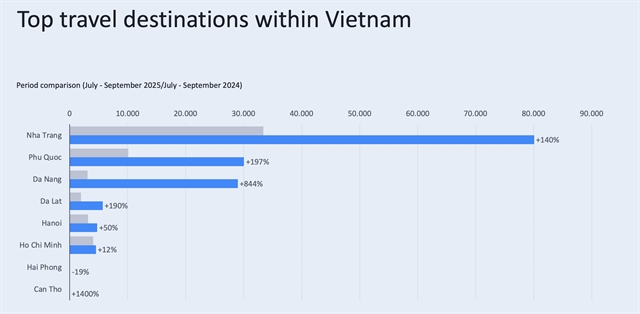 Economy
Economy

Experts recently argued that because public debts are rising, private companies should carry out infrastructure projects without Government guarantees. So are the Government’s sovereign guarantees necessary anymore, when the country still needs capital for infrastructure development?
 |
| Võ Trí Thành |
By Võ Trí Thành*
For many years, Việt Nam’s Government has been acting as a guarantor for a lot of investment projects.
This has increased confidence of both lenders and investors in the implementation and success of the projects.
However, experts recently argued that because public debts are rising, private companies should carry out infrastructure projects without Government guarantees.
So are the Government’s sovereign guarantees necessary anymore, when the country still needs capital for infrastructure development?
It is undeniable that foreign loans have contributed significantly to the country’s infrastructure construction. Major projects have been implemented with preferential loans from foreign partners, especially in construction of highways, airports, bridges and power plants. They are key and priority sectors that are essential to ensure the nation’s economic development.
The majority of these projects have been carried out by State-owned enterprises, while the private sectors only took part in small electricity projects.
In recent years, problems have arisen with Government-funded projects that require the State to change its view and policy in issuance and management of guarantees.
Moral hazard is a regular risk associated with these projects. Corruption and inconsiderate decisions have caused waste and inefficacy, while the absence of any sanctions makes it difficult to assign blame and determine who should cover losses.
Many billion-dollar projects have been delayed for many years causing initial costs to skyrocket, changing low-cost foreign loans into expensive borrowing. Ineffective projects have also burdened public debt which already rises each year.
According to a Ministry of Planning and Investment’s report on Official Development Assistance (ODA), Việt Nam’s public debts in 2018 is expected to increase to around VNĐ3.5 quadrillion (US$150.2 billion), a jump from VNĐ2.2 quadrillion in 2014 and higher than the 2017’s VNĐ3.1 quadrillion.
In terms of Gross Domestic Product (GDP), public debt in 2018 decreased to about 61.4 per cent of GDP from 63.7 per cent of GDP in 2016. This rate is however still higher than the international organisations’ recommendations of around 50 per cent of GDP.
Though this loan expansion is considered necessary to fuel demand for economic growth, which has been averaged 6.8 per cent in the past 10 years, high public debts and difficult State budget accompanied with ineffective and wasteful projects have still raised public concerns over the efficiency of foreign loans.
In addition, many high-profile corruption cases were uncovered and brought to trial, creating undue social influence and diminishing public faith in the State management.
This has led the Government to look at ways to understand the problems and make necessary changes.
First and foremost is efficiency.
Efficiency of Government-guaranteed investments is not only about financial returns of the projects themselves, but also the impact on economic activities, environment, society and overall macroeconomic stability.
Recently, the Government has also encouraged other sectors, especially the private sector, to get involved in the infrastructure projects. Despite some challenges in implementation, using different sources of capital rather than State has proven to be beneficial in reducing moral hazard and risk for State budget.
The Government has also revised legal framework for better financial discipline such as the Law on Public Debt Management which is being drafted and will soon be submitted to the National Assembly (NA) for approval; the State Budget Law which enhances the supervision of the NA in public debt management and gradually reduce the public debt ceiling; as well as upgrading the public private partnership (PPP) regulations into law.
To reign in high public debts in 2017, the Government suspended the new issuance of Government guarantees for foreign loans of enterprises implementing investment projects. Last year, the suspension changed into limitation on granting new Government guarantees for foreign loans with more stringent conditions.
The Government also employs bolder measures to combat corruption and illegal acts concerning public investment projects.
Government guarantees may be needed as Việt Nam still requires large capital to develop infrastructure. However, the issuance and management of the State guarantees must be treated with caution.
On the other hand, the Government should also study other forms of guarantees based on a risk-sharing mechanism and market principles. As infrastructure projects take many years, some tools to hedge and mitigate risks of economic loss arising from the changes in the currency value and other factors should be learned and applied to attract quality investors.
Understanding of the Government guarantee should not be limited in the Government’s taking on responsibility for the loan in the event that the borrower defaults. There should be other borrowing incentives like attractive interest rates and simplifying procedures to attract investment.
The expansion of the guarantee recognition will facilitate investment attraction and project implementation. However, such measures should also be studied specifically and thoroughly.
Việt Nam is integrating more deeply in the world so the country has to follow market principles and face competition. High-profile trade pacts such as Comprehensive and Progressive Agreement for Trans-Pacific Partnership (CPTPP) and EU- Việt Nam Free Trade Agreement (EVFTA) have provisions relating to government procurement which are based on competition, and transparency and are open to foreign investors.
Given the development level of Việt Nam, such agreements have certain flexibility and the country should make room to encourage domestic enterprises in investment projects.
Recently, some big projects including the construction of highway roads and even airports are being carried out by private companies.
Guarantee now is not merely a payment obligation but made possible through the management of the Government and the private sector.
The market will attract more human resources and capital needed to develop. However, the implementation should be based on market principles, transparency, compliance with international commitments but still maintain flexibility to support the development of domestic enterprises’ capabilities.
* Võ Trí Thành is a senior economist at the Central Institute for Economic Management (CIEM) and a member of the National Financial and Monetary Policy Advisory Council. The holder of a doctorate in economics from the Australian National University, Thành mainly undertakes research and provides consultation on issues related to macroeconomic policies, trade liberalisation and international economic integration. Other areas of interest include institutional reforms and financial systems.